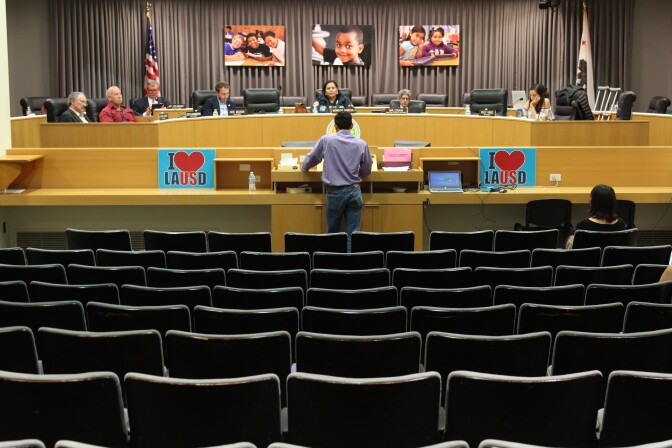This story is free to read because readers choose to support LAist. If you find value in independent local reporting, make a donation to power our newsroom today.
This archival content was originally written for and published on KPCC.org. Keep in mind that links and images may no longer work — and references may be outdated.
The LAUSD superintendent search: What's the latest and why you should care

The Los Angeles Unified School Board is in the final stages of selecting a new superintendent, the administrator in charge of overseeing the nation's second-largest school district and the futures of more than 503,000 students.
L.A. Unified's last permanent superintendent, Michelle King, stepped down in January after announcing she had been diagnosed with cancer. Here's what you need to know about the effort to replace her.
What does the LAUSD superintendent do?
The superintendent is the executive in charge of running the day-to-day operations of the school district. In L.A. Unified, that means overseeing more than 2,400 administrators, who in turn oversee more than 57,000 teachers and other employees.
The L.A. Unified School Board's most important job is to hire a superintendent. Board members set an overall policy vision for the school district. The superintendent, who reports to the board, carries out that vision.
Let's say I don't have kids in LAUSD. Why should I care who is LAUSD's superintendent?
Do you pay taxes in Southern California? Thought you did. L.A. Unified is one of the biggest destinations for your tax dollars. L.A. Unified's $7.5 billion operating budget is bigger than the entire budget of some U.S. states and the K-12 budgets of perhaps two dozen more states. The school district is a massive local government agency and one of the region's biggest employers.
And all of that only matters if you don't care that the superintendent is responsible for the educational futures of more than 503,000 children, most of whom live in poverty.
Let's say I am an LAUSD student. Does the superintendent really affect my life?
In many ways, but here's one concrete example: one of the superintendent's most important annual duties is crafting L.A. Unified's operating budget. The budget is watchdogged and managed centrally — in L.A. Unified's downtown headquarters on Beaudry Avenue.
But many of the dollars are actually spent locally, in more than 1,000 different places — school campuses and other district sites. District-level administrators often refer to school principals "buying" services — because principals have some ability to choose how to spend some of their share of the district's budget. For example, a principal might weigh the choice of "buying" a librarian position against "buying" an extra counselor, school social worker or reading coach.
The superintendent, in overseeing the budget process, plays a role in determining how much flexibility school principals get to spend on their own — and how big a role central office will play in managing the day-to-day lives of the schools.
Okay, but isn't the LAUSD superintendent just a figurehead?
Without question, experts say the L.A. Unified superintendent is an important symbolic figure and political leader. But several superintendent-led initiatives have made their mark:
- Former superintendent Roy Romer had a direct hand in getting three school construction bonds passed in 2002, 2004 and 2005, ultimately leading to the construction of 131 schools. In the span of a decade, L.A. Unified went from emergency levels of overcrowding in schools to having a surplus of space. Though voters passed one of the construction bonds before his tenure and approved another after he left office, any mention of "the nation's largest school building project" is often followed by a nod to Roy Romer.
- In 2014, former superintendent John Deasy launched a push to outfit every L.A. Unified student with an iPad. It did not end well. The cost spiraled upward, from the initially-projected $500 million to more than $1.3 billion. There was controversy about where the money came from. The software didn't work. KPCC reporting on Deasy's emails with the software's publisher raised questions about whether the bidding process was fair. The FBI raided the district for documents. It was a bold initiative that ended poorly — and would come to define (and played a role in ending) Deasy's tenure as superintendent.
- Outgoing superintendent Michelle King did not conceive of the notion of "100 percent graduation" — that is, the goal that every single high schooler in L.A. Unified ought to earn his or her diploma. But King arguably made the graduation goal a central part of her superintendency, leading to notable increases in the district's graduation rate — though some have raised questions about the use of credit recovery programs in achieving that goal.
What's the latest on the search?
https://twitter.com/kystokes/status/987502054703693824
Since the beginning of April, L.A. Unified school board members have met regularly behind closed doors to discuss the superintendent's search.
They have not published a list of candidates or finalists. The Los Angeles Times has reported a list of possible finalists, but KPCC has not been able to independently verify the accuracy of the list. (At least one finalist, Indianapolis superintendent Louis Ferebee, has publicly withdrawn himself from the process.)
School board members are not scheduled to meet again until May 1. In the meantime, longtime L.A. Unified administrator Vivian Ekchian is serving as interim superintendent.







